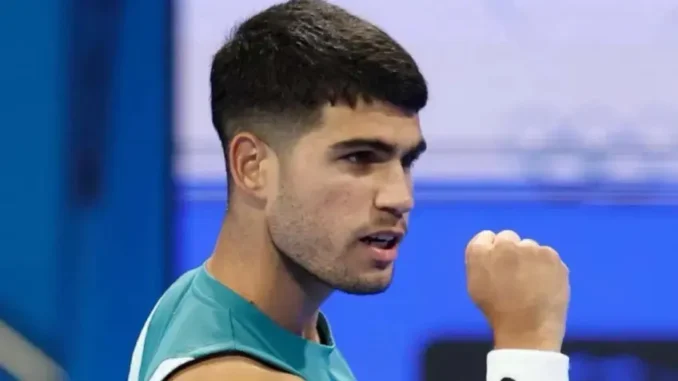
In the high-stakes world of professional tennis, where every stroke and strategy is dissected with surgical precision, a former world No. 1 has turned his analytical eye toward one of the sport’s brightest young stars. Andy Roddick, the American powerhouse who once ruled the ATP rankings and claimed the 2003 US Open title, recently shared his thoughts on Carlos Alcaraz, the Spanish prodigy whose meteoric rise has captivated fans globally. At just 21, Alcaraz boasts four Grand Slam titles—most recently defending his Wimbledon crown and conquering Roland Garros in 2024—yet Roddick believes there’s still a critical piece missing from the young Spaniard’s game. What Alcaraz lacks, according to Roddick, isn’t talent or tenacity, but a layer of consistency that could elevate him from extraordinary to downright unstoppable.
Roddick’s assessment comes at a fascinating juncture in Alcaraz’s career. The Murcia native has already etched his name in the history books, becoming the youngest man to win majors on all three surfaces—hard, clay, and grass—before his 22nd birthday. His 2024 season was a rollercoaster of brilliance and stumbles: triumphant at the French Open and Wimbledon, yet faltering at unexpected moments, like a shocking second-round exit to Botic van de Zandschulp at the US Open. It’s this unpredictability that Roddick finds both endearing and perplexing. “His inconsistency makes you identify with him,” Roddick remarked, painting a picture of a player whose human flaws make his dazzling highs even more relatable. But beneath that charm lies a challenge Alcaraz must conquer to reach the stratosphere occupied by legends like Roger Federer, Rafael Nadal, and Novak Djokovic.
The crux of Roddick’s critique centers on Alcaraz’s approach when the going gets tough. Known for his electrifying shot-making—drop shots that defy gravity, forehands that scream past opponents—Alcaraz often doubles down on aggression when he’s off his game. “When he’s not comfortable and not playing well, his solution is to be more aggressive,” Roddick observed. It’s a strategy that can produce magic, like his comeback against Alexander Zverev in the 2024 Roland Garros final, where he rallied from two sets to one down to claim the title. Yet, it’s also a double-edged sword. In Miami earlier this year, that same boldness backfired in a stunning first-round loss to David Goffin, where Alcaraz’s level plummeted after a promising start. “After the first set, I thought I was going to be better,” Alcaraz admitted post-match, his disappointment palpable as he acknowledged Goffin’s rising intensity outpacing his own.
Roddick sees this pattern as a potential Achilles’ heel—one that separates Alcaraz from the Big Three at their peak. Federer’s elegance, Nadal’s relentless physicality, and Djokovic’s suffocating precision all shared a common thread: a knack for dialing back the flair when needed, grinding out points with calculated consistency. “Most of the greats throughout history tend to find some margin,” Roddick explained, suggesting Alcaraz could benefit from a more measured approach in the early stages of matches. Imagine, he mused, if Alcaraz started a match with a vow to “take this person’s legs out” for the first six games, relying on heavy, consistent groundstrokes to wear down opponents before unleashing his full arsenal. It’s not about abandoning his flair—his “superpower,” as Roddick calls it—but about wielding it more strategically.
This isn’t the first time Roddick has weighed in on Alcaraz’s game. Earlier critiques highlighted the Spaniard’s serve as a work in progress, a point of contention with Alcaraz’s coach, Juan Carlos Ferrero, who countered that biomechanical tweaks have already yielded improvement. Yet, Roddick’s latest take digs deeper, focusing on mentality and decision-making. He’s not alone in marveling at Alcaraz’s potential—after all, this is a player who’s beaten Djokovic on Wimbledon’s hallowed grass twice in a row and outlasted Jannik Sinner in three epic clashes in 2024. But Roddick’s point is clear: raw talent and audacity have carried Alcaraz far, yet mastering the art of restraint could propel him even further.
As Alcaraz prepares for the clay swing and beyond, the tennis world watches with bated breath. Can he harness his explosive style with the discipline Roddick envisions? The Spaniard’s own words hint at self-awareness: “I just wanted to play better,” he said after Miami, a simple yet telling reflection of his hunger to evolve. At 21, time is on his side, and his resume already sparkles with achievements most players chase for decades. But if Roddick’s right, the key to Alcaraz’s next leap lies not in more highlight-reel winners, but in the quiet strength of consistency—a trait that could transform a generational talent into a tennis immortal. For now, the journey continues, and every match is a canvas for Alcaraz to paint his masterpiece, one stroke at a time.
Leave a Reply